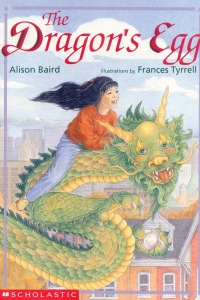| ________________
CM . . . . Volume XVIII Number 10 . . . . November 4, 2011
excerpt:
Ai Lien Feng's father brings her a stone from China for her ninth birthday. It hatches in the night, and a Chinese dragon named Lung Wang emerges. The story follows the two during the year they spend together at Ai Lien's home in Toronto's Chinatown, before Lung Wang has to return to China to his own family. On the night of her tenth birthday, which is also Lung Wang's first birthday and the day of his departure, Lung Wang takes Ai Lien on a farewell visit to his own home in the Yangtze River where she sees many mythical animals of China and meets Lung Wang's parents. How much do you know about Chinese dragons, or about Chinese traditions in general? The Dragon's Egg is a short 137 pages, but it manages to cover a lot of ground; here you have the Chinese New Year in Chinatown, Toronto, with lion dances and dragon dances, the Kitchen God's yearly report to the Jade Emperor on household affairs, fireworks, and lucky money. You have Dragon Boat Races at Centre Island, the Hare of the Moon and the moon goddess Heng O; and, of course, the text holds a lot about Chinese dragons. Apart from all this cultural information, readers also follow Ai Lien's school year after being put in a new school, and how she copes with a bullying situation. I find The Dragon's Egg interesting mostly on the strength of its unusual subject matter. A Chinese dragon will be an unfamiliar creature to many non-Chinese readers in Canada, and most of the text is devoted to showing the reader what a Chinese dragon is, looks like, and can do. From the knowledgeable tone of the book, I assume that the author has done some research on Chinese dragons, while the description of the New Year's festivities in Chinatown (especially the lion dance) is vivid and quite the best part of the book. Sadly, this interesting content does not come together with strong characters and an engaging plot; all the adults in the story (Ai Lien's parents, her school teacher, her grandmother) are blandly unaware of goings-on, classmates are mobs of non-individuals and the main antagonist, Jake, is a cardboard-cutout bully. There are many points that could be, that ask to be explored, such as Ai Lien's relationship with her Mandarin-speaking grandmother or how she was affected by being moved ahead a grade in school, but they go unexplained. As for the plot, it seems more like the events happen to give readers an opportunity to learn different things about Chinese dragons, rather than to highlight a development in Ai Lien and Lung Wang's characters, or their relationship. Speaking of the relationship, I also find it extremely disturbing that Ai Lien will refer to her 'having' Lung Wang, or owning him, a few times throughout the book. This, despite the fact that she recognizes him as a person early on, almost immediately after hearing him speak; despite the explicit statement on page 55, "But of course it was all very degrading for the son of a Dragon King to be treated as if he were a mere pet." There is a general indecision in the narration regarding Lung Wang, seeming to treat him as a person (surely he exhibits personality, perhaps more than any other character in the book) but consistently comparing him to animals; Ai Lien seems to unconsciously share this ambivalence. Towards the end of the story, she gives him a gift for their shared birthday and then remarks that no presents she received this year are as nice as "...the one I got last year...You!" (p. 119, to Lung Wang) – I find that creepy. Despite its weak points, The Dragon's Egg is still a book that is fun to read, largely due to the fascinating details about Chinese dragons. It stands somewhere between being an account of having a magical friend and an account of having a magical pet. It is also a lively account of happenings in Toronto's Chinatown, and the China-related festivals and traditions one can experience there. Recommended with reservations. Saeyong Kim is studying for a Master of Arts in Children's Literature at the University of British Columbia, BC.
To comment
on this title or this review, send mail to cm@umanitoba.ca.
Copyright © the Manitoba Library Association. Reproduction for personal
use is permitted only if this copyright notice is maintained. Any
other reproduction is prohibited without permission.
NEXT REVIEW |
TABLE OF CONTENTS FOR THIS ISSUE
- November 4, 2011.
AUTHORS |
TITLES |
MEDIA REVIEWS |
PROFILES |
BACK ISSUES |
SEARCH |
CMARCHIVE |
HOME |
